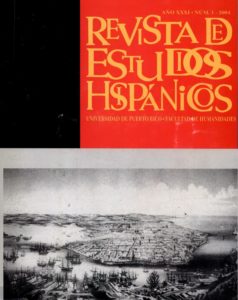Abstract
In the short stories contained in El ombligo del mundo (1924), Ramón Pérez de Ayala examines the worldview and behavior of his countrymen in order to represent in his work their dissociate mentality and the lack of national cohesion, participating in the debate about Spain's identity and educational regeneration which concerned intellectuals and politicians since the nineteenth century. Influenced by the critical and ironic mentality of modernity, his participation is characterized by the questioning of traditional concepts of individuality, nation and art. However, in his narrative Ayala does not adopt a distanced and ironic posture because he approaches his subject, the Spaniards, in an empathetic yet critical manner. Ayala achieves this paradoxical effect by avoiding essentialist generalizations about the national character. Instead, he presents individual cases in order to celebrate the richness of human experience. Although Ayala was aware of the limitations of his artistic medium and his country's grave problems, he continued writing, showing his cautious confidence in the future of the Spaniards and Spain, and in his own contribution through his art.This work is licensed under a Creative Commons Attribution-NonCommercial 4.0 International License.
Downloads
Download data is not yet available.

